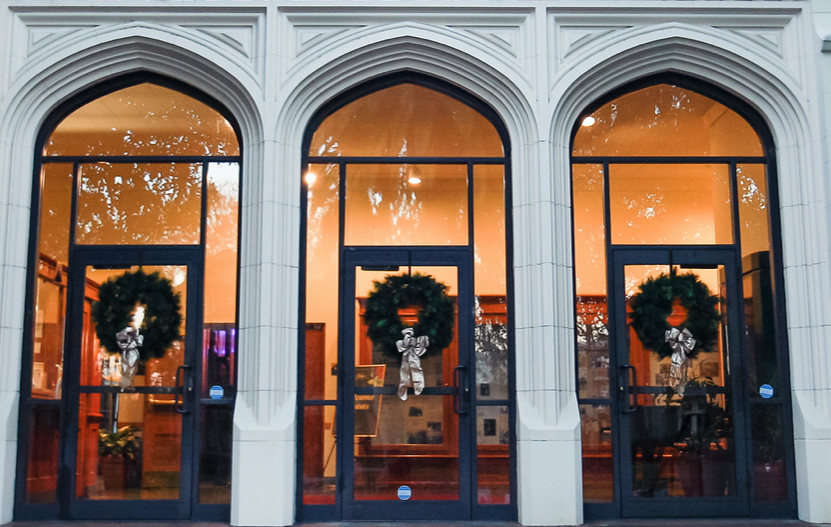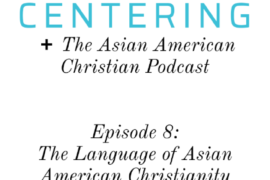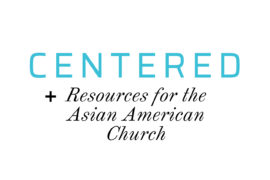[This Advent season, Centered is sharing Asian American Christian reflections on the topic of “Advent and Empire”. Just as the birth of Christ brought peace and deliverance, we hope these entries can speak God’s truth into our times.]
Christians seem to have a complicated relationship with consumerism around Christmas. So complicated, in fact, that most of us don’t really dwell on the issue. Moving to Taiwan and spending holidays here, however, has emboldened me to look at Christmas and its materialist aspects in a new light.
Christianity and Materialism

It’s hard to say whether Christmas in Taiwan is more or less commercialized than it is in the States. On the one hand, there are definitely more decorations and Christmas carols being played in public places in the States. But on the other hand, as commercialized as Christmas may be in the States, there is still a cultural memory that associates the holiday with the birth of Christ.
The average Taiwanese person, however, might not even know that Christmas is supposed to be a religious holiday. Unlike in the States, it does not occur to non-Christians in Taiwan to attend church on Christmas, unless a church has been advertising holiday activities.
Christianity in Asia has long been associated with money and resources. There are many well-respected schools and hospitals that were founded by Western missionaries, after all. This fuels the stereotype in Asia of Christians and Christian institutions being wealthy. Accordingly, non-Christians in Taiwan have no qualms about attending holiday activities at churches simply to enjoy free food and entertainment.
Expensive White Elephants
As a youth counselor, perhaps it’s not surprising that the relationship between materialism and Christianity is most evident to me in a game—White Elephant.
A “White Elephant” gift exchange in the States or amongst expatriate kids in Taiwan is usually understood as re-gifting something you already own, which often results in hilariously impractical gag gifts. The point of the game is not materialistic in nature; it’s supposed to be about fellowshipping with church family, and maybe poking fun at the materialistic gift-giving tradition that Christmas has become for secular America.
In Taiwan, however, gag gifts are generally not well received. My Taiwanese co-workers have emphasized to me that someone may bring a nice gift, so it would be disappointing if the gift they got in return wasn’t as nice. My co-workers also think that it makes the church look bad if we give out cheap gifts. I had to fight to convince my Taiwanese co-workers to allow me to lead two rounds of “White Elephant,” one round for actual “White Elephant” re-gifts and another round for “nice gifts.” I don’t want, after all, to teach youth that fun necessitates getting a nice gift. I also don’t want to exacerbate what I feel is already a problem in Taiwan: the association between Christianity and materialism.
Karma vs. Gift
There is also the issue of Christianity being syncretized with Buddhism and folk religions. In “White Elephant,” this manifests in the idea that if you sacrifice a certain amount of money, you should receive something comparable in return. If you take out the Christ story, what do we have left? An old man—Santa? God? Buddha?—weighing karma and giving appropriate blessings to those who deserve them. Perhaps the familiarity of this picture is why Christmas, despite being a Western import, is “celebrated” to a certain degree in Asia.
This isn’t so different from what we experience in the States. While my Chinese church in California does not blatantly promote a “Prosperity Gospel”, I have found that there is often a Buddhist, Confucian influence on Asian American Christianity. Filial, obedient children are blessed with good grades and success by God. On the opposite side are those Asian American Christians who outright reject Confucian ideologies as “backwards”, finding success in “escaping” traditional Asian values. In both cases, however, being able to buy nice things for yourself and others is often used as a way to measure one’s self-worth.
It may seem odd, but playing “White Elephant” in Taiwan is a reminder to me that there are those in this world – even in the States – who think a relationship with God is transactional. In Asia, perhaps because this ideology is so blatant, Christmas becomes a great opportunity to share with people that material blessings are not a measure of karmic worth.
Christmas should be a reminder to both Asians and Asian Americans that material blessings are nice, but they are not an indicator of how much God loves us. Rather, the Christ story is the real indication of our worth in God’s eyes. God didn’t weigh our karma. He wanted to give us a gift that we didn’t work hard for and that we don’t deserve – salvation through the birth of Christ.



36 Comments
Pingback: relaxing
Pingback: coffee shop ambience
Pingback: ethereal jazz music
Pingback: ทำความรู้จัก SKY WIND
Pingback: Pragmatic Play Slot ค่ายเกมสล็อต
Pingback: cherry gaming casino คืออะไร ?
Pingback: นักสืบเอกชน
Pingback: เสริมจมูก พัทยา
Pingback: จอ led ขนาดใหญ่
Pingback: เทคนิคเพิ่มรอบทำแจ็คพอตของสล็อต Caishen Wins
Pingback: รถเช่าในญี่ปุ่นพร้อมคนขับ
Pingback: dark168
Pingback: bangkok tattoo
Pingback: pgslot168
Pingback: Destination Wedding in France
Pingback: ปั่นสล็อตเว็บใหญ่ ทดลองเล่นเกมฟรี
Pingback: disposable thc vape pen california
Pingback: ufa168
Pingback: เกมยิงปลา ออนไลน์ FISHING GOD
Pingback: myplay168
Pingback: joker369
Pingback: highbay
Pingback: Aviation Tire
Pingback: สล็อต เครดิตฟรี
Pingback: https://simondigital.ir/pocket-option-strategy-landmark-nadezhnyj-put-k/
Pingback: som777 อะไรให้เล่นอีกบ้าง ?
Pingback: lekded987
Pingback: gubet
Pingback: ทดลองเล่นสล็อต
Pingback: เลือกเล่นสล็อตออนไลน์ กับ 5เฮง สล็อต
Pingback: slot ค่ายใหญ่ครบวงจร
Pingback: แทงบอล ufa11k
Pingback: บ้านพักคนชรา
Pingback: พลาสติกปูพื้นก่อนเทคอนกรีต
Pingback: pin up log in
Pingback: Las Vegas SEO Co